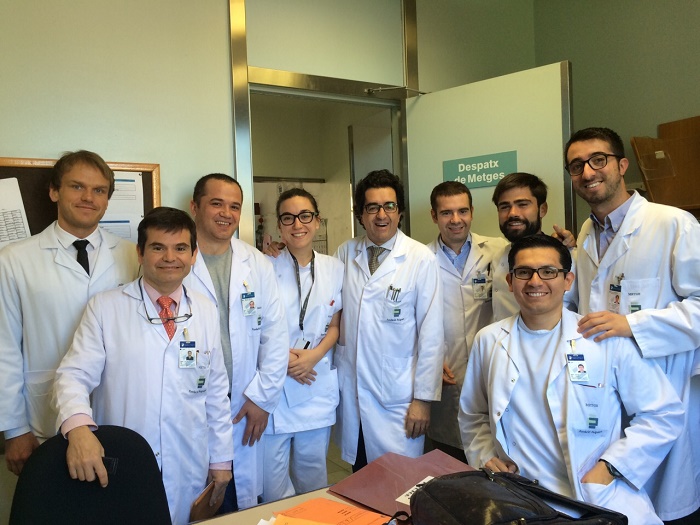-
03 June 2015
Category : Interview
“I’ve seen 10 transplants and I’m impressed”
Through a cooperation project, Dr Galescu, a Moldovan urologist, has had the opportunity to work hand in hand with a medical transplant team in Barcelona.
 Dr Galescu, third from the left, with the team at the Puigvert Clinic in Barcelona
Dr Galescu, third from the left, with the team at the Puigvert Clinic in BarcelonaAndrei Galescu is a urologist at the Republican Clinical Hospital in Chisinau, Moldova. Through the “Strengthening the Transplant Agency of the Republic of Moldova” project, financed by the European Commission and managed by the FIIAPP, along with experts from the OCATT (Catalonian Transplant Organisation), he has had the opportunity to spend a month in Barcelona at the Puigvert Clinic gaining practice in the field of transplants from living donors, a therapeutic option for patients suffering from a terminal renal disease.
Below he tells us some of the differences between Spain and Moldova, and about his experience over this month.
Could you describe to us the current situation of the transplant system in Moldova?
The Moldovan transplant system has great experience dating back to 1982, but at the moment we are in a phase of re-launching transplant surgery. In addition, with a 12-year lag in our country, transplants from deceased donors are being resumed.
What did your stay in Barcelona consist of?
The objective of my visit was to gain practice in the field of transplants from living donors. But during my stay at the Puigvert Clinic, I’ve had many opportunities to learn, and not just about transplants. I’ve had the opportunity to visit other departments, such as lithiasis, oncology, nephrology and others.
During this month you’ve had the chance to be in the operating theatre and assist in transplants. Tell us about your experience.
During this month I’ve seen some 10 transplants and I’m impressed, both by the technical procedures used and by how these transplants were performed. I asked myself how everything was organised, I’m referring to the fact that everything functions perfectly, like a Swiss watch [smiling].
This type of transplants, are they the most needed ones in Moldova?
Definitely yes, but we have also increased the number of transplants from deceased donors.
Besides being in the operating theatre, have you been able to assess patients needing transplants with the Puigvert Clinic’s medical team? What differences are there with Moldova in this assessment?
As far as I know, the Moldovan Transplant Agency is working now on creating a transplant protocol and a series of guidelines adapted to our country. I believe that the majority of these conditions will be the same as in Spain.
What is the greatest difference you’ve been able to note between the Spanish and Moldovan transplant systems?
The technical team, the instruments, and clearly the material financed by the government in this area.
Do you believe that with the help of this European Commission-financed cooperation project, Moldova will improve its transplant system?
Definitely yes. In fact I would like to take this opportunity to express my gratitude to this project.
After this month of working in Spain, what experience are you taking back to Moldova?
I’ve had the chance to learn new things. The staff at the Puigvert Clinic showed me a ton of tips and tricks during surgery, things you can only learn through practice, not in books.
But the main lesson I’m taking home with me is about the need to learn a lot and work hard.
The views and opinions expressed in this blog are the sole responsibility of the person who write them.




